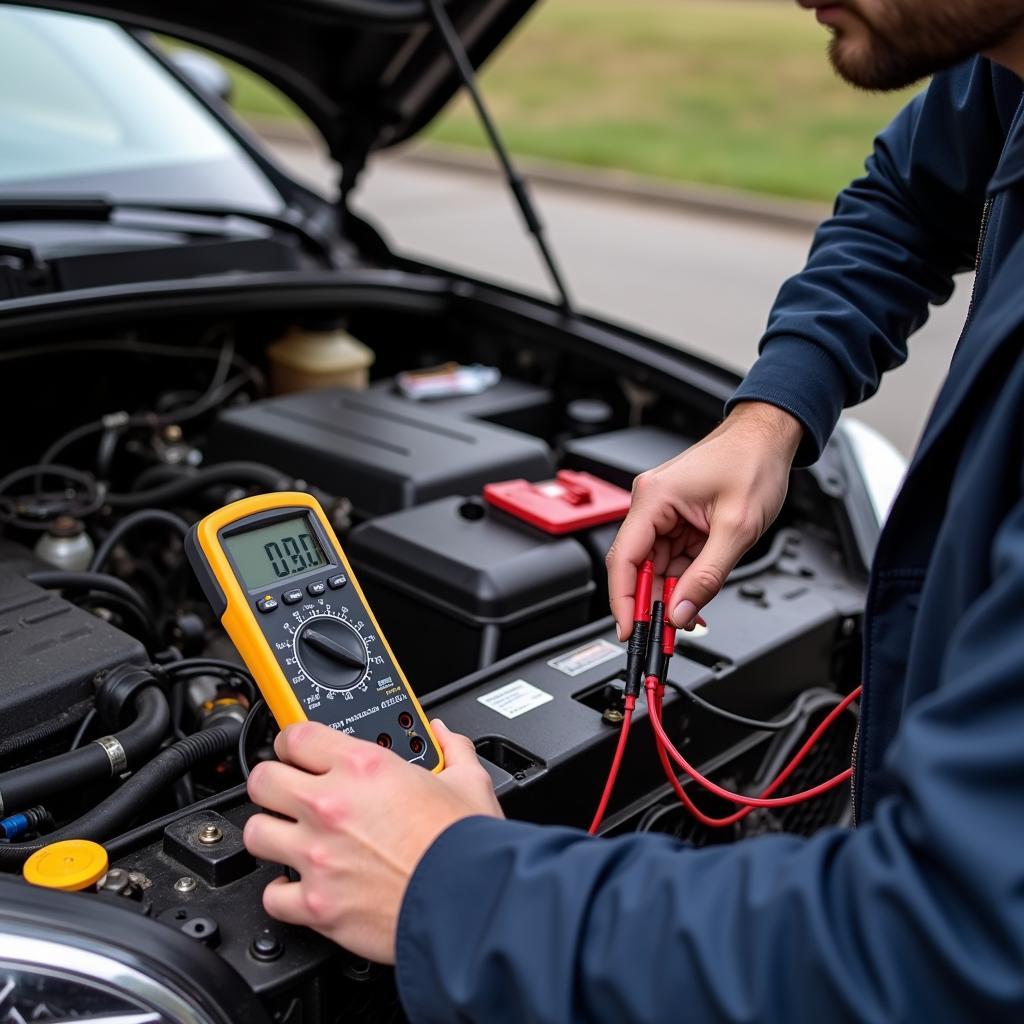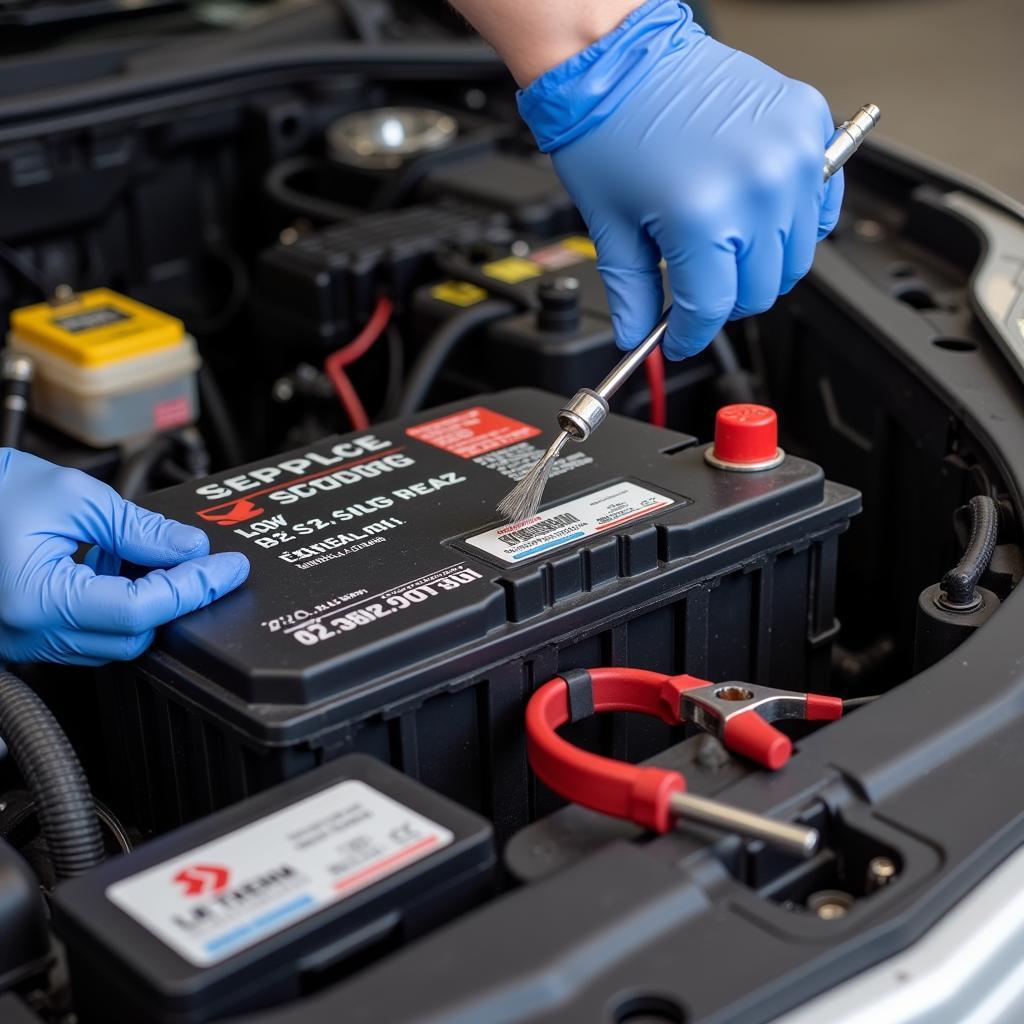A dead car battery after just a week of inactivity can be a frustrating surprise. This article dives into the common causes, diagnostic steps, and solutions for a car battery that dies after not driving for a week, helping you get back on the road quickly and prevent future occurrences.
Several factors can contribute to a car battery dying after a week. One common culprit is a parasitic drain, where a malfunctioning electrical component continues to draw power even when the car is off. car battery died while parked. This could be anything from a faulty interior light to a more complex electronic system issue. Another possibility is simply an aging battery. Over time, batteries lose their ability to hold a charge, making them more susceptible to draining quickly, especially in colder temperatures. Finally, extreme temperatures, both hot and cold, can negatively impact battery performance.
Diagnosing a Dead Battery After a Week
If your car battery is dead after a week, the first step is to confirm the battery is indeed the problem. signs of a dead battery in my car. Try jump-starting the car. If it starts, this points to a battery issue. If not, the problem may lie elsewhere, such as the starter or alternator.
Checking for a Parasitic Draw
Once you’ve confirmed a battery problem, the next step is to check for a parasitic draw. This involves using a multimeter to measure the current draw with the car off and all accessories turned off. A small draw is normal, but anything excessive indicates a parasitic drain. parasitic loss battery.
 Mechanic Using Multimeter to Check for Parasitic Battery Drain
Mechanic Using Multimeter to Check for Parasitic Battery Drain
“A common mistake people make is assuming a new battery will solve the problem,” says automotive electrical expert, John Miller. “If a parasitic drain is present, the new battery will eventually die as well.”
Solutions and Preventative Measures
Addressing a dead battery after a week involves several approaches. If the battery is old or nearing the end of its lifespan, replacement is the most straightforward solution. However, if the issue is a parasitic drain, identifying and fixing the faulty component is crucial. battery loses charge overnight. This may involve checking fuses, relays, and wiring harnesses.
Preventing Future Battery Drain
Preventing future battery drain involves proactive measures. Regularly inspecting the battery for corrosion and cleaning the terminals can help maintain its performance. Minimizing the use of accessories while the engine is off can also prolong battery life. Furthermore, being mindful of extreme temperatures and parking in a garage or shaded area when possible can help protect the battery.
 Maintaining a Car Battery by Cleaning Terminals
Maintaining a Car Battery by Cleaning Terminals
“Regular maintenance is key to preventing battery issues,” adds Sarah Johnson, another experienced automotive electrician. “Just like any other car component, batteries require periodic checks and care to ensure optimal performance.”
Conclusion
A car battery dead after not driving for a week can be a sign of an underlying issue, ranging from a simple aging battery to a more complex parasitic drain. By understanding the causes, utilizing diagnostic techniques, and implementing preventative measures, you can avoid the inconvenience of a dead battery and ensure reliable starts every time. Remember to regularly check your battery, address any potential parasitic drains, and replace your battery when necessary to keep your car running smoothly. parasitic drain on battery probable causes.
FAQs
- How long should a car battery hold a charge without driving? A healthy battery should hold a charge for several weeks, even a month or two, depending on the ambient temperature and the battery’s condition.
- Can leaving interior lights on drain a car battery in a week? Yes, leaving interior lights on, even seemingly small ones, can drain a car battery over a week, especially if the battery is already weak.
- What are some common causes of parasitic drain? Faulty interior lights, glove box lights, trunk lights, door switches, and aftermarket accessories are common culprits.
- How can I test my car battery? You can test your car battery using a multimeter or by taking it to an auto parts store for a free test.
- How often should I replace my car battery? Car batteries typically last between three and five years, but their lifespan can vary depending on usage and climate.
- Can extreme cold weather kill a car battery? Yes, extreme cold can significantly reduce a battery’s capacity and even cause it to freeze, potentially leading to damage.
- What should I do if my car won’t jump-start? If your car won’t jump-start, the problem may not be the battery. It could be the alternator, starter, or another electrical component. It’s best to have a mechanic diagnose the issue.


